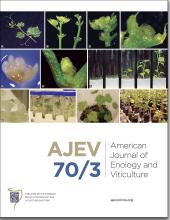Abstract
Potassium polyaspartate (KPA), a colloidal additive for tartaric stabilization, has recently been approved for use in wine (OIV/OENO 543-2016) and has been adopted by many wineries in Europe. Previous research has highlighted its efficacy for tartrate stabilization, which is similar to that of other additives such as metatartaric acid (MT) and carboxymethylcellulose (CMC). However, unlike CMC and MT, KPA has been reported to not affect color or cause haze formation, and to maintain its effect over time. In the present study, we evaluated for the first time the efficacy of KPA in wines treated with different KPA concentrations at high temperatures. A full factorial experimental design was used to investigate the effects and interactions of temperature, storage time, and the dose of KPA on tartaric stability in red and white wines, as evaluated by a conductivity test. The results of this study showed that storage temperature is the variable with the greatest influence on the efficacy of KPA. However, KPA was still able to maintain its efficiency for at least 45 days at temperatures ~40°C, conditions that can sometimes occur during commercial shipment. The results obtained from the conductivity test were consistent with those from a cold test used as a control for measuring tartaric stability.
- carboxymethylcellulose
- factorial design
- potassium polyaspartate
- storage temperature
- tartaric stability
- wine
- Received September 2018.
- Revision received December 2018.
- Revision received February 2019.
- Accepted March 2019.
- Published online July 2019
- ©2019 by the American Society for Enology and Viticulture
Sign in for ASEV members
ASEV Members, please sign in at ASEV to access the journal online.
Sign in for Institutional and Non-member Subscribers
Log in using your username and password
Pay Per Article - You may access this article (from the computer you are currently using) for 2 day for US$10.00
Regain Access - You can regain access to a recent Pay per Article purchase if your access period has not yet expired.










